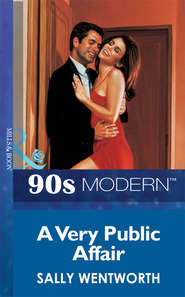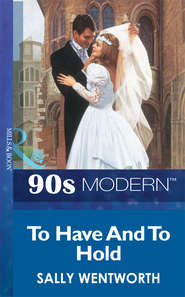По всем вопросам обращайтесь на: info@litportal.ru
(©) 2003-2024.
✖
Christmas Nights
Автор
Год написания книги
2018
Настройки чтения
Размер шрифта
Высота строк
Поля
‘Hell, no! I’m not going to have other men looking at that sexy black underwear of yours going round in the machine. I want to fantasise about it all by myself.’
She flung her arms round him, and kissed him exuberantly. ‘God, I’m crazy about you, Will Brydon.’
‘The feeling’s mutual, ma’am.’
For the next couple of months everything was perfect, except that the wretched migraine attacks returned with painful frequency. But Paris was too happy to take much notice; she just pumped in headache pills until they went away.
She had to go to Europe a few times, once to a big convention in Prague where she was lucky enough to find two new accounts which put her more or less back on the income level she’d been on before. So she was able to insist on paying for all the food bills at the flat, although Will protested. But she felt happier paying her share.
She still saw Emma at work, of course, and they went out to lunch together on a regular basis, remaining friends but tacitly not discussing Will.
He and Paris were sharing their lives almost completely; Paris had taken him to meet each of her parents and their families, and both visits had been successful. In return Will took her to meet his elder brother, Mark, his only close relative since his parents had died some time ago. Mark, with his wife and two young children, lived in a village near Cambridge, where they invited Paris and Will to spend the weekend with them.
They set out from London around mid-morning; the day was fine and they were both in high spirits, Paris in particular looking forward to the trip. She wasn’t at all nervous about meeting Will’s relations; he’d told her a little about them, that they both had careers centred on Cambridge, and they sounded her kind of people.
The couple lived in an old, detached house, all stuccoed walls outside and beamed ceilings within, with an inglenook fireplace framed with a garland of dried hops. The walls of the downstairs sitting-room were ragpainted and then stencilled with an intricate flower design, as were all the cupboards in the traditional farmhouse kitchen. The house looked like something out of a country-living-style magazine and Paris fell for the place at once.
Mark was seven years older than Will, and his wife, Annabel, looked to be about thirty. Their greeting was friendly enough, but both of them seemed a bit distracted. Mark, who was dressed in old jeans and a greasestained T-shirt, gave them each a drink and said, ‘You’ll have to excuse me a minute; I was in the middle of cutting the grass when the damn mower broke down. Perhaps you could come and take a look at it, Will; you’re better at mechanical things than I am.’
Will caught Paris’s eye, gave a slight wink, and the two men went into the garden.
Annabel, dressed similarly to her husband, was kneeling before a four-oven Aga, almost in an attitude of worship, an anxious frown on her face as she looked at some cakes she was cooking. There seemed to be a lot of small cakes around, either cooling or waiting in trays to be cooked.
‘Are you fond of cakes?’ Paris asked curiously.
‘What?’ Annabel laughed and stood up. ‘No, the village is having an open day tomorrow and I offered to make some cakes to sell with the teas. I think it’s so important when you live in the country to take an active part in village life. Don’t you?’
Paris had never thought about it, but it seemed that the question was merely rhetorical because Annabel glanced at her watch, gave an annoyed sigh, and said, ‘Oh, Lord, I was supposed to pick up the girls from their dancing class ten minutes ago. And then I have to dash into town so that Olivia can buy a present for a friend’s birthday. The party is this afternoon and she insists on choosing the present herself. Which is good, of course, don’t you think? Children should have the right of choice. We were supposed to buy the present some time last week but somehow there was just too much happening.’
She knelt again at the Aga, took a batch of cakes out and put another lot in.
When she straightened, Paris knew what was coming but didn’t volunteer. Annabel said, ‘I know it’s an awful cheek, but would you be an absolute angel and cook the rest of these cakes for me while I get the girls? I’m sorry to land it on you but it’s one of those days.’
‘I’m not very good at cooking and I’ve never used one of those cookers before,’ Paris warned her.
‘Oh, good heavens, you don’t need any skill. Just have a look now and again to see if they’re done. Thanks a million; I must fly.’
Annabel dashed upstairs, came down again ten minutes later wearing a smart town outfit, and ran outside to her car.
Those first few minutes seemed to set the tone for the whole weekend. Annabel rang on her personal phone about an hour later, full of apologies and asked Paris to start lunch for her. By the time she rushed in with her two daughters the lunch was ready and waiting; Will, having found out what was the matter with the mower and bought a new part from the local garden centre to fix it, was now mowing the large area of grass, and Mark was watering the plants in the greenhouse.
Paris thought that they’d relax over lunch but it seemed that the girls had to go to their violin lessons, arranged at an earlier time than usual because of the friend’s birthday party, and they were already late.
‘I’m sorry, I’ll just have to rush,’ Annabel said, and then, remembering, added, ‘Oh, dear, I haven’t shown you your room yet, have I? Never mind; Will knows where it is.’
It was a nice room, with views looking out on two sides over the garden and meadows beyond. But the bed hadn’t yet been made up and they had to search for sheets and things and do it themselves. The walls were marked out for another stencil effect but were only partly done and there were no curtains on the windows.
‘How long have they lived here?’ Paris asked.
‘About six years,’ Will said laconically.
Paris was surprised; she’d have thought that Annabel would have finished the decorating by now.
When Annabel and her daughters hurried home an hour or so later, Olivia went up to have a bath and change into her party clothes and Charlotte, the younger child, immediately began to make a big fuss because she hadn’t been invited.
‘Never mind, darling. We’ll do something really special together instead,’ Annabel soothed.
‘What? What will we do?’ Charlotte naturally wanted to know.
‘I’ll think of something,’ Annabel said, almost curtly, and she went to the stairs to yell at Olivia to hurry up. But when she took Olivia to the party, Annabel must have got sidetracked because she didn’t come back, so it was left to Paris to try and amuse the younger child, but as Paris had no experience and Charlotte was grumpy it didn’t work too well. Charlotte kept going to the window to look for her mother and when she didn’t come went up to her room, locked herself in, and wouldn’t come out or answer when Paris spoke to her.
Will, meanwhile was helping Mark to unblock some gutters; or, at least, Will was up the ladder doing so while Mark, who was supposed to be holding it, kept wandering off to dig his overgrown vegetable patch or to answer the phone, although most of the callers seemed to want Annabel.
That evening some friends had been invited to dinner, which Annabel cooked herself. She wasn’t a bad cook, but, by the time she’d given the girls their pizzas, put them to bed, done the preparations for the meal, made half a dozen phone calls and got herself ready, it was very late before they sat down to eat, and almost three in the morning before the other guests left.
Curling tiredly up to Will, Paris said, ‘Is it always like this?’
‘Always,’ he said resignedly.
The next day they were both roped in to help with the village open day, Paris helping Annabel in the tea tent and Will directing cars into the field being used as a car park, so they hardly saw one another. The main Sunday meal, to which Annabel liberally invited several neighbours, wasn’t ready until eight in the evening, and Paris found herself doing most of the clearing up, as she had that morning because Annabel had been too tired to do it the night before.
It was midnight before they were able to drive back to London, Paris feeling more exhausted than she had when they’d arrived, and afraid that one of the blinding migraines was about to take over her head.
‘Are you all right?’ Will asked her when she grew silent. And when she admitted that her head ached he said angrily, ‘I’m hardly surprised after the last two days. They don’t have to live like that. They could well afford for Annabel not to work, but she insists on combining the roles of wife, mother, career woman and active villager. And tries to be perfect at everything but with the result that everything suffers.
‘She’s forever torn between her job, her home and her family, and most of the time the job comes first. After school and in the holidays the girls are looked after by a child-minder or are farmed out to various friends. And when Annabel is home she’s always trying to decorate the place in the latest fashion, or she’s out at some village organisation committee meeting.’
There was disgust in his voice as well as anger, but Paris felt compelled to stand up for her sex and say, ‘I’m sure she’s doing everything for the best.’
‘That’s just it; her intentions might be good but she doesn’t have the sense to see that she’s achieving nothing. Her family is suffering and so is she. She just cannot manage that lifestyle.’
‘What does Mark think about it?’ Paris asked guardedly.
Will shrugged. ‘He’s tried to persuade her to give up her job but she won’t. She says she won’t be fulfilled if she does.’ The disgust was heavy again in his voice. ‘If she was so wrapped up in her career she shouldn’t have gone in for a family in the first place.’
‘Rubbish!’ Pans said shortly. ‘A woman has every right to have both a family and a career. Men do, don’t they? And thousands of women have children and have to go out to work. Annabel isn’t very organised, that’s all.’
Will gave a sarcastic snort. ‘She tries to be all things to all people and it doesn’t work. You saw that for yourself. And, the way I see it, bringing up children should be a full-time job; they need all the help, education and training they can to get to face today’s problems.
‘There wouldn’t be half the juvenile crime and adolescents with psychological problems if they’d got more attention at home. Most of them are thrust in front of the television screen to keep them quiet when they’re babies and can work a video before they can talk. They become latchkey kids as soon as they go to school, and live off junk food for the rest of their lives.’
Вы ознакомились с фрагментом книги.
Приобретайте полный текст книги у нашего партнера:
Приобретайте полный текст книги у нашего партнера:











